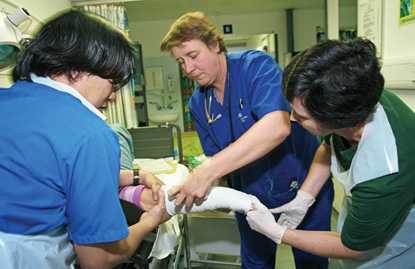By Richard Johnstone | 3 September 2012
Any moves to introduce local pay into the public sector could lead to ministerial resignations, Public Finance has been told.
 Senior Liberal Democrat MP John Pugh said proposals to introduce more ‘market-facing pay’ should be shelved when reports from public sector pay review bodies are published this autumn.
Senior Liberal Democrat MP John Pugh said proposals to introduce more ‘market-facing pay’ should be shelved when reports from public sector pay review bodies are published this autumn.
Chancellor George Osborne asked the independent bodies to ‘consider how public sector pay can be made more responsive to local labour markets’ in last year’s Autumn Statement. He confirmed in this year’s Budget that ‘more local pay’ agreements could be introduced as the two-year public sector pay freeze comes to an end this year.
However, experts have told PF that it is unlikely that the proposal could be in place in time, and Pugh said that ‘there’s plainly confusion’ about the government’s intentions. He warned that the ‘ill-thought out’ policy could ‘exacerbate’ the differences between the regions in Britain.
Pugh is the co-chair of the LibDem parliamentary committee for health and social care. In June, he published a critical report examining the history of regional pay in the public sector that was backed by 24 backbench LibDem colleagues.
‘I’m clear that I’m speaking not just for the backbenchers but a goodly number of ministers as well, particularly those whose areas are likely to be affected by regional pay. It’s the kind of issue that could provoke ministerial resignations,’ he told PF.
The public sector already has some flexibility for pay deals to vary by location including the Agenda for Change agreement in the NHS, and so-called ‘zonal pay’ in the Courts Service, where wages are set based on five zones. Treasury sources told PF that a model similar to the one operating in the Courts Service is among those being considered as a possible reform.
However, Pugh said any attempts to increase variation within these structures were being stymied by the prospect of further change. ‘I would agree that it hasn’t been realised, but that’s because the government is now storing up a political maelstrom around a new set of proposals. It’s politically foolish to open up a new front with the public sector, particularly as we are trying to rebalance the economy.’
Public sector pay experts told PF that it was unlikely that the government would be in a position to introduce more localised pay this year.
Bob Elliott, director of the Health Economics Research Unit at Aberdeen University, said he expected the government to announce that a move to regional pay was ‘desirable but not possible in the short term’.
Elliott, who had previously been an adviser to the 1982 Committee of Inquiry into Civil Service Pay predicted that the government would reveal a ‘long-term framework to move towards’ local pay.
A centrally determined system would be put in place to introduce the proposals, he added. ‘It’s unlikely, for example, they will just hand it over to schools. They tried that before; it didn’t work.’
John Van Reenen, director of the Centre for Economic Performance at the London School of Economics, agreed that any move that ‘would mean decreasing pay in some areas’ needed to be part of ‘a long-term framework’.
However, he said there was evidence that similar pay levels across the NHS made it difficult to recruit nurses in areas where other occupations had higher wages. Allowing some areas to introduce pay rises above inflation could alter this.
Van Reenen revealed he had made a similar recommendation to former Labour health secretary Alan Milburn when he worked for the Department of Health in 2001. Given the coalition’s spending plans, this ‘would have been much easier then than it is now’, he added.
A Treasury spokeswoman told PF that ‘nothing has yet been decided’ on local pay.
She added: ‘As the chancellor set out in the 2011 Autumn Statement, there is a case for considering how public sector pay could better reflect local labour markets. For example, people working in the public sector are paid around 8% more on average than those in the private sector, according to the Institute for Fiscal Studies.
‘In line with the usual process the government will consider the independent pay review bodies’ reports and publish and respond in the autumn.’



Any moves to introduce local pay into the public sector could lead to ministerial resignations, Public Finance has been told.
 Senior Liberal Democrat MP John Pugh said proposals to introduce more ‘market-facing pay’ should be shelved when reports from public sector pay review bodies are published this autumn.
Senior Liberal Democrat MP John Pugh said proposals to introduce more ‘market-facing pay’ should be shelved when reports from public sector pay review bodies are published this autumn.Chancellor George Osborne asked the independent bodies to ‘consider how public sector pay can be made more responsive to local labour markets’ in last year’s Autumn Statement. He confirmed in this year’s Budget that ‘more local pay’ agreements could be introduced as the two-year public sector pay freeze comes to an end this year.
However, experts have told PF that it is unlikely that the proposal could be in place in time, and Pugh said that ‘there’s plainly confusion’ about the government’s intentions. He warned that the ‘ill-thought out’ policy could ‘exacerbate’ the differences between the regions in Britain.
Pugh is the co-chair of the LibDem parliamentary committee for health and social care. In June, he published a critical report examining the history of regional pay in the public sector that was backed by 24 backbench LibDem colleagues.
‘I’m clear that I’m speaking not just for the backbenchers but a goodly number of ministers as well, particularly those whose areas are likely to be affected by regional pay. It’s the kind of issue that could provoke ministerial resignations,’ he told PF.
The public sector already has some flexibility for pay deals to vary by location including the Agenda for Change agreement in the NHS, and so-called ‘zonal pay’ in the Courts Service, where wages are set based on five zones. Treasury sources told PF that a model similar to the one operating in the Courts Service is among those being considered as a possible reform.
However, Pugh said any attempts to increase variation within these structures were being stymied by the prospect of further change. ‘I would agree that it hasn’t been realised, but that’s because the government is now storing up a political maelstrom around a new set of proposals. It’s politically foolish to open up a new front with the public sector, particularly as we are trying to rebalance the economy.’
Public sector pay experts told PF that it was unlikely that the government would be in a position to introduce more localised pay this year.
Bob Elliott, director of the Health Economics Research Unit at Aberdeen University, said he expected the government to announce that a move to regional pay was ‘desirable but not possible in the short term’.
Elliott, who had previously been an adviser to the 1982 Committee of Inquiry into Civil Service Pay predicted that the government would reveal a ‘long-term framework to move towards’ local pay.
A centrally determined system would be put in place to introduce the proposals, he added. ‘It’s unlikely, for example, they will just hand it over to schools. They tried that before; it didn’t work.’
John Van Reenen, director of the Centre for Economic Performance at the London School of Economics, agreed that any move that ‘would mean decreasing pay in some areas’ needed to be part of ‘a long-term framework’.
However, he said there was evidence that similar pay levels across the NHS made it difficult to recruit nurses in areas where other occupations had higher wages. Allowing some areas to introduce pay rises above inflation could alter this.
Van Reenen revealed he had made a similar recommendation to former Labour health secretary Alan Milburn when he worked for the Department of Health in 2001. Given the coalition’s spending plans, this ‘would have been much easier then than it is now’, he added.
A Treasury spokeswoman told PF that ‘nothing has yet been decided’ on local pay.
She added: ‘As the chancellor set out in the 2011 Autumn Statement, there is a case for considering how public sector pay could better reflect local labour markets. For example, people working in the public sector are paid around 8% more on average than those in the private sector, according to the Institute for Fiscal Studies.
‘In line with the usual process the government will consider the independent pay review bodies’ reports and publish and respond in the autumn.’





















